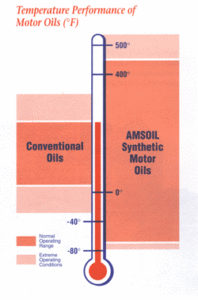It’s the best synthetic engine oil your money can buy. But what is AMSOIL? and how is it made? It starts with synthetic base oils manufactured to higher performance levels. AMSOIL engine oil is chemically engineered with a specific molecular composition that is the key to squeezing out the desired performance properties of these fluids. This chemically engineered structure results in a far more stable product than refined petroleum products.
What does that mean for you practically? Less wear and tear, better fuel efficiency, less sludge, and longer oil change intervals are a good start.
Find all the AMSOIL synthetic oils engineered for your vehicle.
“The main advantage of mineral oils is their low cost.
The main limitation of mineral oils is that… the lubricant-sized molecules have a variety of structures ranging from the best to the worst (in terms of wear control).”
A. Jackson, Mechanical Engineering Transactions
“The First In Synthetics” ®
… and Still The Best!
In 1973, AMSOIL launched the first 10W-40 synthetic motor oil approved by the American Petroleum Institute (API) for automotive use. Nowadays, these oils still exceed the latest API standards, providing our customers with unparalleled engine oil protection.
The Process of Making Engine Oil
Conventional engine oils – the oils most people are familiar with – are refined from crude oil, a process of physically separating light oil components from heavy ones.
Crude oil contains millions of different kinds of molecules. Many are similar in weight but not in structure. The refining process cannot distinguish such molecules, so a wide assortment of molecules is present in the finished lubricant made from crude oil stocks.
The assorted molecules of refined lubricants also have different shapes, making lubricant surfaces irregular at the molecular level. As lubricant layers flow across one another during the lubrication process, these irregularities create friction, which consumes power, reduces efficiency and increases heat and wear.
But some crude oil molecules are not beneficial to the lubrication process. For example, paraffin causes refined lubricants to thicken and flow poorly in cold temperatures. Molecules containing sulfur, nitrogen, and other elements invite the formation of sludge and other products of lubricant breakdown, especially in high-temperature applications. Higher wear rates are the result, leading to issues like oil consumption, loss of power, and higher maintenance.
These are the chemicals that help modern motor oils meet the increasing demands of today’s high-tech engines. Their quality varies widely throughout the lubrication industry, ranging from a bare minimum in some oils (to comply with certain requirements) to exceptionally high quality, as in all AMSOIL engine oils and the complete product line of AMSOIL synthetic lubricants.
Discover more about AMSOIL Products, Customer Promo Code offers and Company News.
Receive the AMSOIL newsletter.
The Process of Making Synthetic Lubricants
 AMSOIL synthetic lubricants differ from refined oils in three key ways: synthetics are pure, their molecular structure is uniform, and they may be designed to work in applications in which refined oils cannot.
AMSOIL synthetic lubricants differ from refined oils in three key ways: synthetics are pure, their molecular structure is uniform, and they may be designed to work in applications in which refined oils cannot.
Pure
The feedstocks from which AMSOIL synthetic lubricants are made do not contain sulfur, nitrogen, or other elements that invite the formation of sludge and other products of lubricant breakdown. Synthetic lubricants can be used in higher temperatures than refined lubricants without breaking down. Their resistance to breakdown also allows them to be used longer than refined lubricants. Systems stay cleaner and last longer with synthetic lubricants.
Uniform
The feedstocks from which AMSOIL engine oil is made feature a uniform and smooth molecular structure, which ensures low friction as lubricant layers slide across one another. Reduced friction increases energy throughput for greater fuel efficiency and power and reduces heat and wear for longer equipment life.
Molecular uniformity also helps synthetics resist thinning in heat and thickening in cold, which helps them protect better than refined oils over a system’s operating temperature range and helps ensure secure sealing. Synthetics can give economic benefits when used in place of mineral oils that were working satisfactorily, and it’s proven with field experience. The benefits fall into five general areas:
- Engine oil with Improved energy efficiency and cleaning additives.
- Wider operating temperature range.
- Meet the demand for up-to-date design viscosity ratings.
- Using better oils can help reduce maintenance needs.
- Better reliability.
Designable
 Many different kinds of feedstocks may be used to create synthetic lubricants, allowing a synthetic to be designed for virtually any application. Some feedstocks are ideal for use in extremely cold environments. Others are perfect for use in extreme heat. Some are extremely safe in applications in which refined lubricants pose a fire or explosion hazard. Refined oils simply do not offer the design flexibility synthetics offer.
Many different kinds of feedstocks may be used to create synthetic lubricants, allowing a synthetic to be designed for virtually any application. Some feedstocks are ideal for use in extremely cold environments. Others are perfect for use in extreme heat. Some are extremely safe in applications in which refined lubricants pose a fire or explosion hazard. Refined oils simply do not offer the design flexibility synthetics offer.
Synthetics’ design versatility enables them to be adapted specifically to the needs of everyday applications, like automobile engines & transmissions, commercial hydraulic equipment, or industrial diesel machinery. This precision guarantees that the lubricated system will have a long lifespan with the optimal power, performance, and fuel efficiency, and the lubricant will also last a long time.
How does AMSOIL make Synthetic Lubricants? Video series hosted by Banks Power
This interview series will answer questions such as what additives, how much, and what characteristics make AMSOIL engine oil a superior product. Additionally, viewers will get a virtual tour of the AMSOIL INC. manufacturing facility.
How is AMSOIL made?
Synthteic oil additives
Chemical lab testing
Mechanical lab testing
AMSOIL Synthetic lubricants have three main characteristics that set them apart from refined oils: they start with only the purest base oils and chemicals, and the molecules are arranged in a consistent manner, allowing for lubricants to be specially formulated to work in situations where regular oils are not suitable.
Why AMSOIL synthetic lubricants perform better in HOT and COLD weather
It’s like the difference between a third-grader’s crayon drawings and an original Picasso – ‘refined quality’ says it all. AMSOIL oils are formulated with a patented synthetic (synthesized or synthetically combined) base stock oil technology, which produces advantages far beyond other lubricants. And we like to think of it as art and science together.
A few of the inherent qualities of AMSOIL’s base stock oil include:
- Resistance to high-temperature volatility (will not evaporate at moderate to high temps)
- Lower cold weather pour points (AMSOIL ALM 5W-20 -53 ºC / -63 ºF)
- Higher shear strength (AMSOIL up to 3,000 psi. / compared to 800 psi. with conventional oils)
- Resist oxidation (one of the primary reasons for oil destruction)
In addition to superior base stock technology, AMSOIL synthetic lubricants include a chemically advanced additive package specific to equipment applications. The finished product exceeds industry standards and ranks highest in overall performance and protection. Making these oils since 1972, AMSOIL is recognized as the leader in the industry by continually setting higher engineering benchmarks. The company’s position is never to formulate its lubricants down to a cheaper price but rather to engineer products to be the best in the industry.
AMSOIL synthetic lubricants offer a wide variety of engine oils and lubricants for use in very specific applications. From a technical standpoint, that’s the only way a lubricant can provide the highest level of reliability and performance. Customers who want the best performance, protection, reliability, and extended drain intervals choose AMSOIL for this key reason.
“Our company makes the best lubricants in the World, and challenges anyone or any company to prove us wrong! That won’t happen because our competitors know it’s true.”
A. J. Amatuzio, President and CEO AMSOIL INC.
